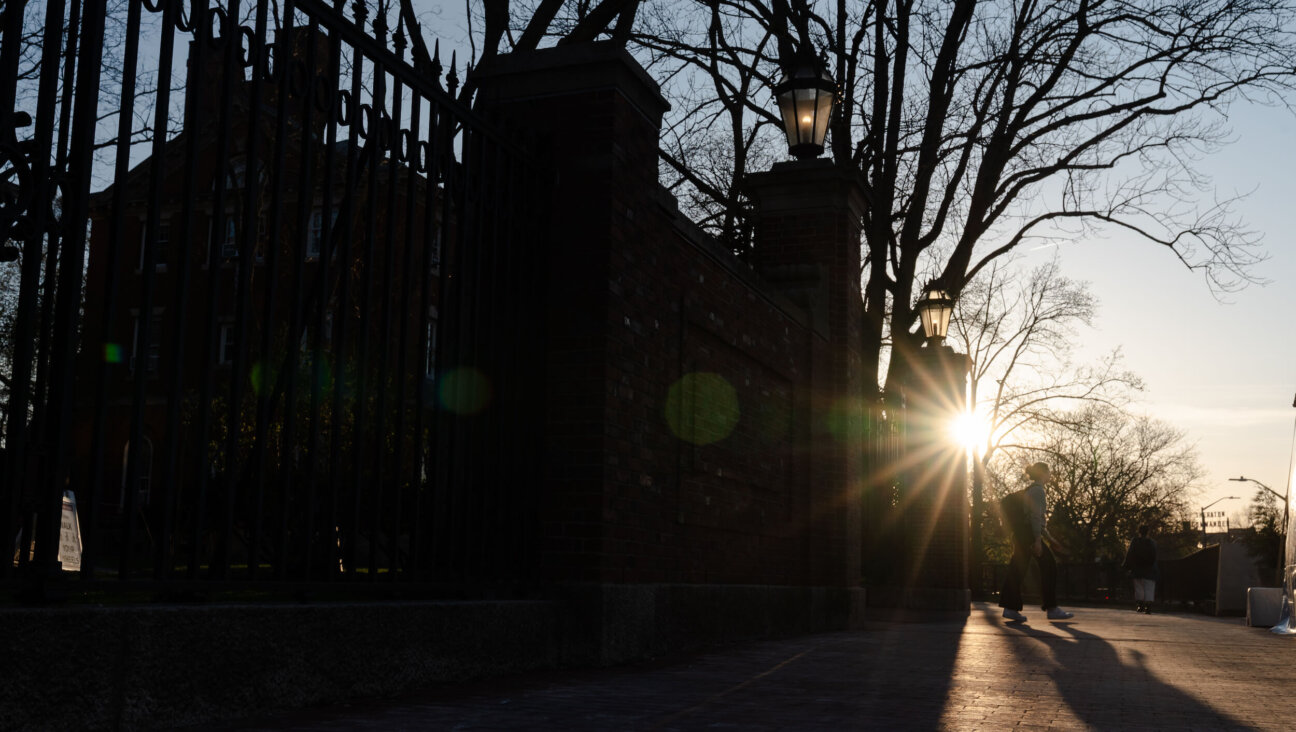Sharon, Abbas Seek U.S. Support on Settlements
WASHINGTON — As they prepare for separate meetings with President Bush, Israeli Prime Minister Sharon and Palestinian Authority leader Mahmoud Abbas are battling to secure White House endorsements of their conflicting positions on West Bank settlements.
Sharon, who will travel to Crawford, Texas, on April 11 for his first meeting at Bush’s private ranch, wants Bush to clarify and elaborate on his assurance, in writing in April 2004, that Israel should not be expected to withdraw from large settlement blocs in the West Bank as part of a final status deal with the Palestinians, Israeli diplomats said. Sharon is also seeking American approval for the continued construction in such Jewish settlements.
Sharon’s top adviser, Dov Weisglass, will meet with Bush’s top aides in Washington next week to hammer out understandings — possibly some public presidential comments — to be unveiled in Crawford.
Abbas, who is expected to meet Bush at the White House later this month, is seeking American and international commitments to impose a settlement freeze on Israel. He is also trying to solidify America’s traditional position opposing the construction of Jewish settlements in the West Bank. Before heading to Washington, Abbas will travel through Europe and the Arab world to rally critics of the American endorsement of Sharon’s plan to maintain large settlement blocs.
The two upcoming meetings are shining a light on the challenges facing the White House as it seeks to maintain support for Sharon, while also trying to help boost Abbas, said Aaron David Miller, former senior State Department adviser for Arab-Israeli negotiations.
Israel’s settlement activity is getting in the way of the administration’s second priority, said Miller, who now heads the Seeds of Peace youth organization, which brings together Arab and Israeli teenagers from the region.
But he added that the administration is not at the point where it would jeopardize a smooth Gaza withdrawal for the sake of asserting its opposition to settlement activity. The Bush administration is well aware of the limited support that Sharon has in his own Likud Party for the Gaza disengagement plan, and therefore “would do nothing to impede or make Sharon’s domestic difficulties more severe than they already are,” Miller said.
This concern over Sharon’s standing was evident last week when the administration rushed to extinguish an American-Israeli flare-up regarding settlements. Damage control was administered after two developments that angered Sharon.
First, U.S. Secretary of State Condoleezza Rice criticized harshly Israel’s decision to construct 3,500 more housing units in the settlement of Ma’ale Adumim, northeast of Jerusalem. The construction would ultimately connect Ma’ale Adumim to Jerusalem through a planned land corridor known as E-1. Successive American administrations have strongly opposed the E-1 plan. The Bush administration has been inconsistent, at times pushing to stop the construction plan and at other times turning a blind eye to it. When Israel stated its intention to build there, Rice told the Los Angeles Times that the plan was “at odds with American policy,” and that the Israeli explanations she has demanded in relation to the plan were “not really a satisfactory response.”
The second development that upset Sharon was a quote incorrectly attributed to America’s ambassador in Israel, Daniel Kurtzer. The United States allegedly dismissed Bush’s assurances to Sharon regarding the settlement blocs.
Sharon was livid and claimed that the leak of Kurtzer’s comments was an attempt to bring down his government.
In reaction, Rice rushed to give an interview to Israel Radio, in which she insisted that “no one should say that there is no agreement between the two governments [regarding the future of West Bank Settlement blocs].”
Rice said, “That’s wrong. There is.”
The Forward is free to read, but it isn’t free to produce

I hope you appreciated this article. Before you go, I’d like to ask you to please support the Forward.
Now more than ever, American Jews need independent news they can trust, with reporting driven by truth, not ideology. We serve you, not any ideological agenda.
At a time when other newsrooms are closing or cutting back, the Forward has removed its paywall and invested additional resources to report on the ground from Israel and around the U.S. on the impact of the war, rising antisemitism and polarized discourse.
This is a great time to support independent Jewish journalism you rely on. Make a Passover gift today!
— Rachel Fishman Feddersen, Publisher and CEO
Most Popular
- 1

News Student protesters being deported are not ‘martyrs and heroes,’ says former antisemitism envoy
- 2

News Who is Alan Garber, the Jewish Harvard president who stood up to Trump over antisemitism?
- 3

Politics Meet America’s potential first Jewish second family: Josh Shapiro, Lori, and their 4 kids
- 4

Fast Forward Suspected arsonist intended to beat Gov. Josh Shapiro with a sledgehammer, investigators say
In Case You Missed It
-
Fast Forward Jewish students, alumni decry ‘weaponization of antisemitism’ across country
-

Opinion I first met Netanyahu in 1988. Here’s how he became the most destructive leader in Israel’s history
-

Opinion Why can Harvard stand up to Trump? Because it didn’t give in to pro-Palestinian student protests
-

Culture How an Israeli dance company shaped a Catholic school boy’s life
-
Shop the Forward Store
100% of profits support our journalism
Republish This Story
Please read before republishing
We’re happy to make this story available to republish for free, unless it originated with JTA, Haaretz or another publication (as indicated on the article) and as long as you follow our guidelines.
You must comply with the following:
- Credit the Forward
- Retain our pixel
- Preserve our canonical link in Google search
- Add a noindex tag in Google search
See our full guidelines for more information, and this guide for detail about canonical URLs.
To republish, copy the HTML by clicking on the yellow button to the right; it includes our tracking pixel, all paragraph styles and hyperlinks, the author byline and credit to the Forward. It does not include images; to avoid copyright violations, you must add them manually, following our guidelines. Please email us at [email protected], subject line “republish,” with any questions or to let us know what stories you’re picking up.











